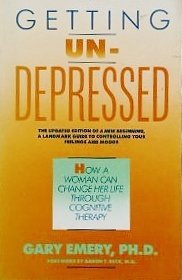Are You Mindful?
Are you conscious of what you think about most of the time? Surprisingly, many people are not. You sometimes hear people say things like “Oh I’ll be happy when my house is paid for” or “I’ll be happy when I retire” or “I’ll be happy when I find my perfect mate”.
Sadly, people who say such things do not know how to be happy. They are postponing their happiness to a future date. Happiness is the inevitable result when you focus on the present moment, have become conscious of your daily patterns of thought and you work to control those patterns.
In other words, happiness is a choice you make every day! Of course, the other side of the coin is that if you do not choose happiness, you will be unhappy, perhaps even depressed.
People who are depressed have allowed negative, self-defeating patterns of thought dominate their daily lives. It shouldn’t be any surprise that depressed people are often fatigued much of the time, unmotivated and unenthusiastic.
Getting Un-Depressed
Getting Un-Depressed is a self-help book by Dr. Gary Emery, a clinical psychologist and expert on cognitive-behavioral therapy. The book aims to help readers overcome depression by teaching them how to identify and challenge their negative thoughts, emotions and behaviors.
The book, available through Amazon, also provides practical strategies for coping with stress, improving self-esteem, and enhancing relationships. The book is based on scientific research and clinical experience, and includes exercises, worksheets, and case examples to illustrate the concepts and techniques. To order a copy click on the link below.

Success in every area of life becomes possible when you become conscious of the things that occupy your mind most of the time! For example, we have all heard people who say things like “gosh, I never get any good breaks’. For the person who becomes conscious that they are prone to thinking thoughts like this, the next step is to interrupt such thoughts when they come and replace that negative thought with something else.
Such a person could think, for example, something like “everything always works out for me” or “I am blessed” or “I’m so grateful for the things that I have”. It isn’t hard to see that this kind of thinking probably makes a person feel better about themselves and their circumstances. Abraham Lincoln said this more than 150 years ago, “Most folks are about as happy as they make up their minds to be,” and it’s as true today as when he first said it. Even when we are in the midst of daunting circumstances, there is still so much to be happy about and grateful for.

One of the most important skills we can develop in our personal and professional lives is becoming conscious or mindful of our thought patterns. Our thoughts shape our reality, influence our emotions, and affect our actions. By becoming aware of how we think, we can identify and challenge the limiting beliefs, negative biases, and cognitive distortions that hold us back from achieving our goals and living a fulfilling life.
In this blog post, I will share some tips on how to become more conscious or mindful of your thought patterns, and how to use this awareness to create positive changes in your life.
Tip 1: Observe your thoughts without judgment. The first step to becoming conscious or mindful of your thought patterns is to simply observe them as they arise, without trying to change, suppress, or judge them. You can do this by practicing mindfulness meditation, journaling, or simply paying attention to your inner dialogue throughout the day. The goal is to become a curious and compassionate witness of your own mind, and to notice the themes, patterns, and triggers of your thoughts.
Tip 2: Identify the types of thoughts you have. The second step is to categorize the types of thoughts you have, and to recognize how they affect you. Some common types of thoughts are:
- Facts: These are objective statements that can be verified by evidence. For example, “I have a meeting at 10 am.”
- Opinions: These are subjective statements that reflect your personal perspective or preference. For example, “I don’t like meetings.”
- Assumptions: These are statements that you take for granted as true, without having enough evidence or information. For example, “The meeting will be boring.”
- Predictions: These are statements that you make about the future, based on your expectations or fears. For example, “The meeting will go badly.”
- Evaluations: These are statements that you make about yourself, others, or situations, based on your standards or values. For example, “I’m not good enough for this meeting.”
Each type of thought has a different impact on your emotions and behaviors. For instance, facts are neutral and factual, opinions are personal and subjective, assumptions are uncertain and risky, predictions are speculative and anxiety-provoking, and evaluations are judgmental and self-critical. By identifying the types of thoughts you have, you can become more aware of how they influence you.
Tip 3: Challenge your unhelpful thoughts. The third step is to challenge the unhelpful thoughts that cause you distress or prevent you from reaching your potential. Unhelpful thoughts are usually based on false or distorted beliefs, such as:
- All-or-nothing thinking: You see things in black-and-white terms, without any shades of gray. For example, “If I don’t ace this meeting, I’m a failure.”
- Overgeneralization: You draw sweeping conclusions from a single event or piece of evidence. For example, “I always mess up meetings.”
- Mental filter: You focus on the negative aspects of a situation and ignore the positive ones. For example, “The meeting was a disaster because I stuttered once.”
- Disqualifying the positive: You reject or minimize the positive aspects of a situation or yourself. For example, “The meeting went well but only because I got lucky.”
- Jumping to conclusions: You make negative assumptions about what others think or feel, or what will happen in the future, without checking the facts. For example, “They think I’m incompetent.” or “I’ll never get promoted.”
- Magnification or minimization: You exaggerate the importance or severity of a situation or yourself, or downplay it. For example, “This meeting is a matter of life and death.” or “This meeting doesn’t matter at all.”
- Emotional reasoning: You base your judgments on how you feel rather than on reality. For example, “I feel nervous so I must be unprepared.”
- Should statements: You impose unrealistic or rigid rules on yourself or others. For example, “I should be perfect at this meeting.” or “They should appreciate me more.”
- Labeling: You attach negative labels to yourself or others based on a single trait or action. For example, “I’m a loser.” or “They’re jerks.”
- Personalization: You blame yourself for things that are not entirely your fault, or take things personally that are not meant for you. For example, “It’s my fault that the meeting went wrong.” or “They’re laughing at me.”

To challenge your unhelpful thoughts, you can use some questions such as:
- What is the evidence for and against this thought?
- Is this thought based on facts or feelings?
- Is this thought helpful or unhelpful?
- What is the worst-case scenario? How likely is it? How could I cope with it?
- What is the best-case scenario? How likely is it? How could I make it happen
Why not try it out? Become more aware of the kinds of things you think about on a daily basis. If a thought you are thinking is making you feel bad, immediately replace such thoughts with thoughts that make you feel good. Of course becoming mindful and more self-aware takes some practice. But like anything else that requires practice, the more you practice the better you get.
“Finally, brethren, whatsoever things are true, whatsoever things are honest, whatsoever things are just, whatsoever things are pure, whatsoever things are lovely, whatsoever things are of good report, if there be any virtue and if there be any praise, dwell on these things.” Philippians 4:8

If you would like to receive periodic updates from BetterHealthBetterYou enter your first name and best email in the form below then click on the orange ‘submit’ button. We look forward to having you join us!
To Your Limitless Success,

Grant Edward Rayner
BELIEVE and Achieve
An over-reliance on Big Pharma in the management of pain has created an opioid epidemic in North America destroying lives and families. There is now an all-natural, non-addicting way to alleviate muscle and joint pain. To learn more click on the image below.
